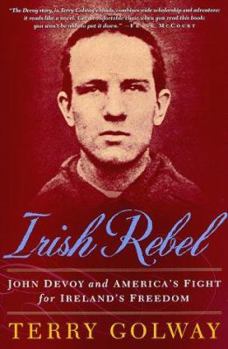Irish Rebel: John Devoy and America's Fight for Ireland's Freedom
Select Format
Select Condition 
Book Overview
In 1871, John Devoy, a young Irishman fighting for Irish independence, came to the United States in exile. Yet even while across the ocean, this Fenian greatly influenced Irish affairs. Terry Golway's... This description may be from another edition of this product.
Format:Hardcover
Language:English
ISBN:0312181183
ISBN13:9780312181185
Release Date:January 1998
Publisher:St. Martin's Press
Length:371 Pages
Weight:1.58 lbs.
Dimensions:1.3" x 6.5" x 9.6"
Customer Reviews
3 ratings
A Soldier's Song for a Proud Fenian Man
Published by Thriftbooks.com User , 16 years ago
My first introduction to John Devoy came as a student. I was studying the response of Irish-American newspapers to the outbreak of World War One and Devoy was a highly influential editorialist whose opinions were frequently reprinted in various Irish journals throughout the USA. He was a determined opponent of Woodrow Wilson's policy to intervene in the European conflict on behalf of the Allied Powers, generally, and in alliance with Great Britain specifically. When public opinion turned against Imperial Germany, Devoy argued in favor of neutrality. Devoy was a tireless agitator and advocate for the cause of Irish independence. He was imprisoned as rebel and his sentence was commuted on the condition that he agree to live out the remainder of his days in exile. He had been arrested for his participation in the Irish Republican Brotherhood after British agents infilitrated the group as a means to disrupt the Fenian plan to invade British North America (Canada). It was thought that staging such an attack would provoke a war between the United States and Great Britain that would in turn serve to liberate Ireland. While Devoy was languishing in prison, Fenian troops were able to cross the border and enter the Province of Ontario from the State of New York. A brief skirmish followed and the invaders were quickly beaten and forced to withdraw. Following his release and exile, Devoy committed the remainder of his life to promoting "The Cause." He attended meetings, wrote editorials, raised funds and organized membership campaigns over and over again. He traveled throughout the United States and worked alongside or quarreled with almost every important Irishman of note during his lifetime. Terry Golway has done a commendable job of honoring the memory of an undeservedly forgotten Irish patriot who performed most of his labors in relative anonymity on a distant foreign shore.
Fenian's Rainbow
Published by Thriftbooks.com User , 23 years ago
Golway tells the tale of John Devoy, greatest of the American Fenians, and a pivotal, if hitherto neglected, figure in the history of Irish nationalism. Devoy was an longlived agitator, fundraiser, journalist, convicted Irish revolutionary and American refugee who bankrolled Parnell, Patrick Pearse and Michael Collins, butted heads with the Ulster Presbyterian Woodrow Wilson and the egomaniacal Eamon de Valera, and sacrificed his personal happiness in the process. Golway's prose is sharp and terse, with a propulsive narrative drive. A fine work of history.
Valuable intro to Irish America's support for Irish rebels
Published by Thriftbooks.com User , 25 years ago
I wanted to take the opportunity to write after finishing the book this past week; it's a good start for anybody curious about the roots of the support--in money, arms, rhetoric, and/or direct assistance--that Irish Americans have long given for Irish freedom. Often, the zeal of the "exiled children in America", as we're referred to in the Irish Proclamation of Independence from 1916, has surpassed that of those Irish we've left behind back home. Golway's book gives you some of the reasons why this disparity may have emerged--the force of the Famine, deportation of many Fenians, the Civil War's effect in giving unwitting assistance to many Americans who returned to agitate in Ireland and abroad, and the economic success gained by a few Irish emigrants and even more the sacrifices of a few dollars of many many more Irish who did the grunt-work which fueled the fortunes of those few, no doubt. Today, many of these emigrants' descendants are criticized as "plastic Paddies" who know little about Ireland beyond a few ballads and sentimental slogans. Both their critics and their supporters among the Irish Americans themselves should study this book, which uses Devoy's long career as a basis for a complicated study of how factionalism, quarrels, and a somewhat clumsy mixture of idealism and pragmatism all combined to effect change back in Ireland. And it should also instruct those who still support the Irish struggle today--it shows the pettiness and begrudgery that has often plagued U.S. efforts at grassroots aid. Although at times in the later sections, I lost track of who was outwitting who in all of the internecine backstabbing among the various claimants of The Cause, this is not to discredit Golway's skill. He had an intricate story to narrate, and he keeps it fresh and even witty, without pandering to his readers. His own experience as a journalist, a career shared by Devoy, undoubtably enriches much of the ambiance behind this sometimes reticent figure, too. I often wonder how a biographer, faced with a subject who's written his or her autobiography already, can calculate a new angle from which to view the person. Golway manages to integrate Devoy's own words sparingly, and by filling in much of the context which Devoy would have kept mum about (or not known of), the author presents a surprisingly relevant case study of the dangers and the seductions of trying to achieve an ideal in a messy world of spies, politicians, revolutionaries, businessmen, and everyday folks. In a time when many Irish and non-Irish alike are taking a renewed and justified pride in this island's heritage, this book introduces you to the American contribution to the Irish situation. (I also was impressed by the author's taking the time to comment on his work in response to a superficial criticism posted; his graceful manner of answering his hasty critic shows real class.)






